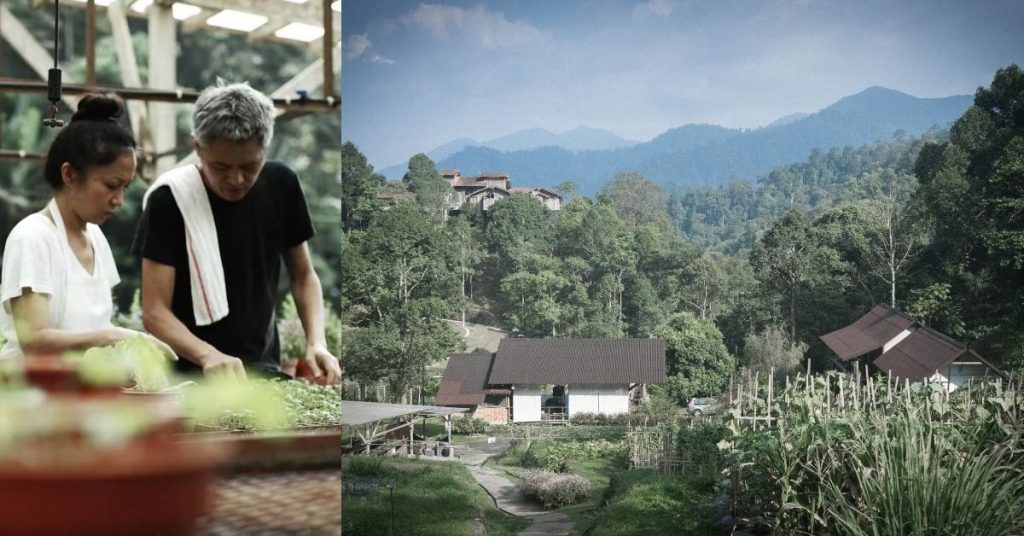Farm-to-table dining experiences are no doubt becoming more familiar to Malaysians. But if you’re in the Klang Valley, you’ll find that most of them utilise newer farming methods like hydroponics.
If you’re located in the city, it’s no surprise that this is a more suitable farming method, seeing how little land we have to farm on top of the city’s less-than-ideal environment.
Outside of the city though, most notably in Pahang, more farms are able to work with the ample land they have—like this 6-acre farm in Janda Baik, a little farm on the hill.
Despite not having as much land to work with, the farmers behind it want to stick to conventional farming methods in their farm.
Farming was not initially in their plans
Urbanites Lisa Ngan and Pete Teo found love in living off-grid in what was originally supposed to be Lisa’s father’s retirement garden. But slowly that fondness turned into a vision of farming for themselves.
7 years ago, the duo started working on their farm together but didn’t have much success with growing their crops in the early years.

“We didn’t even have house plants before, let alone know how to grow vegetables or manage a farm. But between learning from the internet, books and farmer friends, we were able to acquire enough skills along the way,” Pete shared with Vulcan Post.
“We often tell people that we are ‘Google farmers’ and we are not entirely joking.”
Today, they grow a variety of 30-40 types of herbs, vegetables, flowers, and fruits. “We prefer growing crops that’ll do well in cooler climates. But we often grow things specifically for certain customers and these can be lowland crops too,” he added.
Because they understand that they can’t compete on price or volume against bigger industrial farms, they diversify and specialise.
All of them are grown in small to medium-sized batches, and they supply to restaurants like Dewakan, Atas, Sitka, Table & Apron, Ember, and Entier, to name a few.

Plenty on their plate
Every farm-to-table restaurant has their own fun take on it, for instance, Bug’s Paradise Farm lets you pick vegetables from the farm to consume in your hotpot.
Lisa and Pete on the other hand decided to focus on nurturing the community when building their own farm-to-table attraction. As a result, their farm is filled with activities like cheese-making classes, yoga classes, gardening classes, to make the 40-minute drive from the city worth the trip.

“The biggest challenge here is how to balance our desire to contribute to the community against our need to survive as a business. The latter is mainly a factor of financial calculus, and the former one of passion,” Pete clarified.
“It is not always possible to satisfy both criteria, but we try. What we don’t do is run the business based on the principles of profit maximisation alone.”
Compared to city farms using newer farming methods, it could be said that they have more to juggle on their plate. Not many farm-to-table restaurants have to deal with their own compost, repair their tractor, or worry about harvest yield, but they do.

Traditional farming with the help of some tech
While these folks don’t use hydroponics, aquaponics, and newer farming methods, but they don’t shun agritech. Pete thinks of their work on the farm as leaning towards strategic and ethical challenges compared to physical challenges.
Besides streamlining manual processes to make labour more efficient, they also use agritech to have:
- automated watering and aerating systems;
- integrated online systems between frontend sales and backend accounting;
- integrated customer order, harvesting, and delivery systems;
- an in-house crop wiki and a company message board that everyone can access from their mobile phones.
“As said, under the farm’s rural idyll is actually a robust digital backbone holding everything together,” Pete proudly shared.

Confident they’ll survive the pandemic
Because of MCO, they’ve pivoted to deliveries for their farm-to-table meals. This is to help cushion their dine-in sales which have dropped by 75%.
“We were marginally making losses last year and expect to be severely in the red this year on account of the MCO. But we’ve been prudent with our reserves since the MCO began and we are confident of surviving the crisis,” Pete assured.
In fact, they kept all their staff despite the struggles and even hired more last August because they were short-handed.
“Staff morale and motivation has remained high despite these tough circumstances,” he said regarding their proudest achievement during the pandemic.

Currently, there are 11 employees working with Lisa and Pete on the farm. With farmhands being an integral part of keeping the farm’s operations up and running, the founders don’t skimp on looking out for them.
Their staff are provided with accommodation on a little farm on the hill’s premises where most have their own room and sanitary facilities, WiFi access, microwave ovens, fridges, dehumidifiers, safes, etc. Medical insurance is provided to them too.
There’s a library that everyone can use to upskill themselves, as the duo believes in growing not just career-wise but also as a person. Non-English speaking staff also get free English lessons. Thus far, this investment in their staff has yielded positive results for the farm.
“We don’t have empire-building ambitions. We’d be happy just perfecting our modest little farm for what remains of our lives,” Pete concluded. “You can’t really ask for much more than that.”
- You can learn more about a little farm on the hill here.
- You can read more about other agriculture-related startups we’ve written here.
Featured Image Credit: Lisa Ngan and Pete Neo, founders of a little farm on the hill











